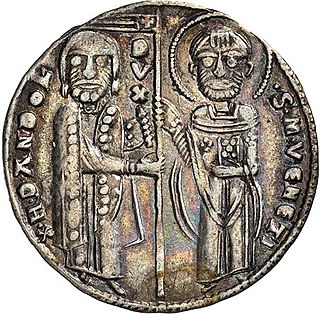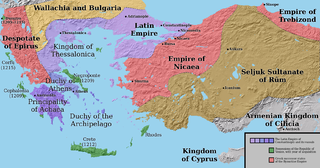Related Research Articles
Primate is a title or rank bestowed on some important archbishops in certain Christian churches. Depending on the particular tradition, it can denote either jurisdictional authority or (usually) ceremonial precedence.

Enrico Dandolo was the doge of Venice from 1192 until his death in 1205. He is remembered for his avowed piety, longevity, and shrewdness, and his role in the Fourth Crusade and the Sack of Constantinople. Dandolo died in 1205 in Constantinople and was buried at the Hagia Sophia.

The Latin patriarch of Antioch was a prelate of the Latin Church created in 1098 by Bohemond I of Taranto, founder of the Principality of Antioch, one of the crusader states.

The Patriarch of Venice is the ordinary bishop of the Archdiocese of Venice. The bishop is one of only four patriarchs in the Latin Church of the Catholic Church. The other three are the Patriarch of Lisbon, the Patriarch of the East Indies and the Latin Patriarch of Jerusalem. Presently, the only advantage of this purely formal title is the bishop's place of honor in papal processions. In the case of Venice, an additional privilege allows the patriarch, even if he is not a cardinal, the use of the colour red in non-liturgical vestments. In that case, the red biretta is topped by a tuft, as is the custom with other bishops who are not cardinals.

This is a list of the Patriarchs of Grado.

The siege of Zara or siege of Zadar was the first major action of the Fourth Crusade and the first attack against a Catholic city by Catholic crusaders. The crusaders had an agreement with Venice for transport across the sea, but the price far exceeded what they were able to pay. Venice set the condition that the crusaders help them capture Zadar, a constant battleground between Venice on one side and Croatia and Hungary on the other, whose king, Emeric, pledged himself to join the Crusade. Although some of the crusaders refused to take part in the siege, the attack on Zadar began in November 1202 despite letters from Pope Innocent III forbidding such an action and threatening excommunication. Zadar fell on 24 November and the Venetians and the crusaders sacked the city. After wintering in Zadar, the Fourth Crusade continued its campaign, which led to the siege of Constantinople.
This page is a list of Catholic bishops and archbishops of Ravenna and, from 1947 of the Archdiocese of Ravenna and Cervia, which in 1985 became styled the Archdiocese of Ravenna-Cervia. The earlier bishops were frequently tied to the Exarchate of Ravenna.
Henry, known as Enrico Pescatore, was a Genoese adventurer, privateer and pirate active in the Mediterranean at the beginning of the thirteenth century. His real name is said to have been Erico or Arrigo di Castro or del Castello di Candia.

Thomas Francis Madden is an American historian, a former chair of the history department at Saint Louis University in St. Louis, Missouri, and director of Saint Louis University's Center for Medieval and Renaissance Studies.

Papal appointment was a medieval method of selecting the Pope. Popes have always been selected by a council of Church fathers; however, Papal selection before 1059 was often characterized by confirmation or nomination by secular European rulers or by the preceding pope. The later procedures of the Papal conclave are in large part designed to prohibit interference of secular rulers, which to some extent characterized the first millennium of the Roman Catholic Church, e. g. in practices such as the creation of crown-cardinals and the claimed but invalid jus exclusivae. Appointment may have taken several forms, with a variety of roles for the laity and civic leaders, Byzantine and Germanic emperors, and noble Roman families. The role of the election vis-a-vis the general population and the clergy was prone to vary considerably, with a nomination carrying weight that ranged from nearly determinative to merely suggestive, or as ratification of a concluded election.

The Partitio terrarum imperii Romaniae, or Partitio regni Graeci, was a treaty signed among the crusaders after the sack of the Byzantine capital, Constantinople, by the Fourth Crusade in 1204. It established the Latin Empire and arranged the nominal partition of the Byzantine territory among the participants of the Crusade, with the Republic of Venice being the greatest titular beneficiary. However, because the crusaders did not in fact control most of the Empire, local Byzantine Greek nobles established a number of Byzantine successor kingdoms. As a result, much of the crusaders' declared division of the Empire amongst themselves could never be implemented. The Latin Empire established by the treaty would last until 1261, when the Empire of Nicaea reconquered Constantinople, re-establishing the Byzantine Empire. The various crusader principalities in southern Greece and the Aegean archipelago would last much longer, until they were conquered by the Ottomans in the 14th and 15th centuries.
The Venetian Interdict of 1606 and 1607 was the expression in terms of canon law, by means of a papal interdict, of a diplomatic quarrel and confrontation between the Papal Curia and the Republic of Venice, taking place in the period from 1605 to 1607. While it was active, the Interdict saw expulsions of some religious orders from Venice, a pamphlet war, and intense diplomacy by France and Spain to resolve the issue. Paolo Sarpi was one of the most prominent Venetian figures involved in the interdict. Leading defenders of the legitimacy of the interdict were the Jesuits Robert Bellarmine and Antonio Possevino.
The Church of San Clemente is a church built in 1131 and located on San Clemente Island, in the Venetian Lagoon. The name is dedicated to Pope Clement I, who died as a martyr according to legend and who is patron of seamen.
Giovanni Polani was Bishop of Castello, Italy, from 1133 to 1164. He was engaged in a long-running dispute over jurisdiction with Enrico Dandolo, the Patriarch of Grado.

The Diocese of Castello, originally the Diocese of Olivolo, is a former Roman Catholic diocese that was based on the city of Venice in Italy. It was established in 774, covering the islands that are now occupied by Venice. Throughout its existence there was tension between the diocese, the Patriarchate of Grado to which it was nominally subordinate, and the Doge of Venice. Eventually in 1451 the diocese and the patriarchate were merged to form the Archdiocese of Venice.
Enrico Dandolo was Patriarch of Grado, Italy, from 1134 to 1182. A member of a noble Venetian Dandolo family, after his appointment he put the interests of the church ahead of all other concerns.

The Order of Friars Minor is a mendicant Catholic religious order, founded in 1209 by Francis of Assisi. The order adheres to the teachings and spiritual disciplines of the founder and of his main associates and followers, such as Clare of Assisi, Anthony of Padua, and Elizabeth of Hungary, among many others. The Order of Friars Minor is the largest of the contemporary First Orders within the Franciscan movement.

This chronology presents the timeline of the Crusades from the beginning of the Third Crusade, first called for, in 1187 to the fall of Acre in 1291. This is keyed towards the major events of the Crusades to the Holy Land, but also includes those of the Reconquista, the Popular Crusades and the Northern Crusades.
References
- ↑ "Vodka Drinks". Esquire. 2015-10-02. Retrieved 2018-09-04.
- ↑ Hayes, Carlton Joseph Huntley (1911). . In Chisholm, Hugh (ed.). Encyclopædia Britannica . Vol. 12 (11th ed.). Cambridge University Press. p. 683.